Organisational Behaviour Report: Analysis of Tesco's Performance
VerifiedAdded on 2023/01/12
|14
|4654
|22
Report
AI Summary
This report provides an in-depth analysis of organisational behaviour within Tesco, a multinational retail company. It examines the influence of organizational culture, power dynamics, and political factors on individual and team performance. The report explores various motivational theories, including Maslow's Hierarchy of Needs and Vroom's Expectancy Theory, and their application within Tesco. It also differentiates between effective and ineffective team structures, incorporating concepts from Tuckman's team development model and Belbin's team roles. The report further investigates Hofstede's cultural dimensions and their impact on Tesco's operations. Overall, the report offers a comprehensive overview of organisational behaviour principles and their practical implications within the context of a global retail environment, providing valuable insights into the management of employees and teams to enhance overall business performance.
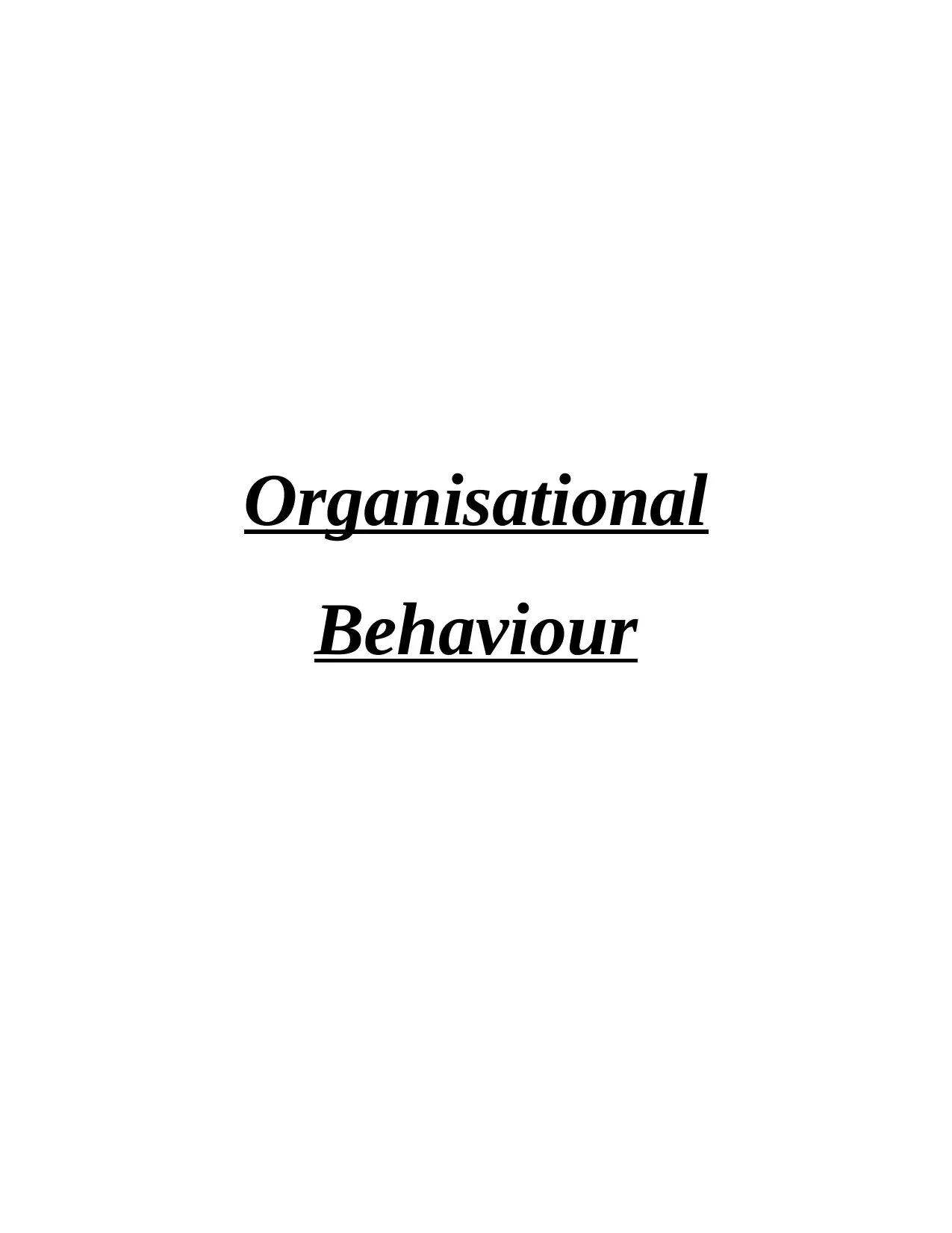
Organisational
Behaviour
Behaviour
Paraphrase This Document
Need a fresh take? Get an instant paraphrase of this document with our AI Paraphraser
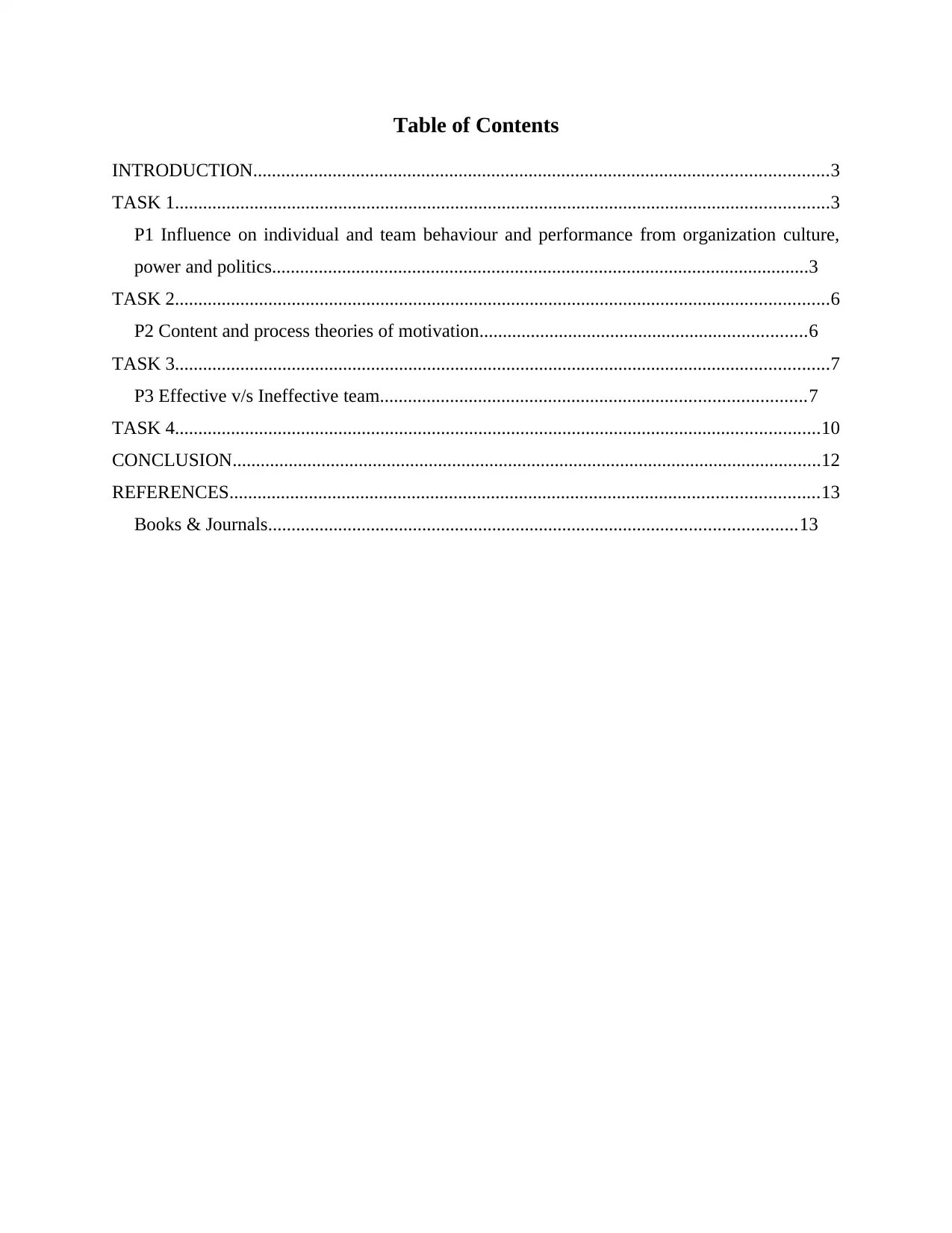
Table of Contents
INTRODUCTION...........................................................................................................................3
TASK 1............................................................................................................................................3
P1 Influence on individual and team behaviour and performance from organization culture,
power and politics...................................................................................................................3
TASK 2............................................................................................................................................6
P2 Content and process theories of motivation......................................................................6
TASK 3............................................................................................................................................7
P3 Effective v/s Ineffective team...........................................................................................7
TASK 4..........................................................................................................................................10
CONCLUSION..............................................................................................................................12
REFERENCES..............................................................................................................................13
Books & Journals.................................................................................................................13
INTRODUCTION...........................................................................................................................3
TASK 1............................................................................................................................................3
P1 Influence on individual and team behaviour and performance from organization culture,
power and politics...................................................................................................................3
TASK 2............................................................................................................................................6
P2 Content and process theories of motivation......................................................................6
TASK 3............................................................................................................................................7
P3 Effective v/s Ineffective team...........................................................................................7
TASK 4..........................................................................................................................................10
CONCLUSION..............................................................................................................................12
REFERENCES..............................................................................................................................13
Books & Journals.................................................................................................................13
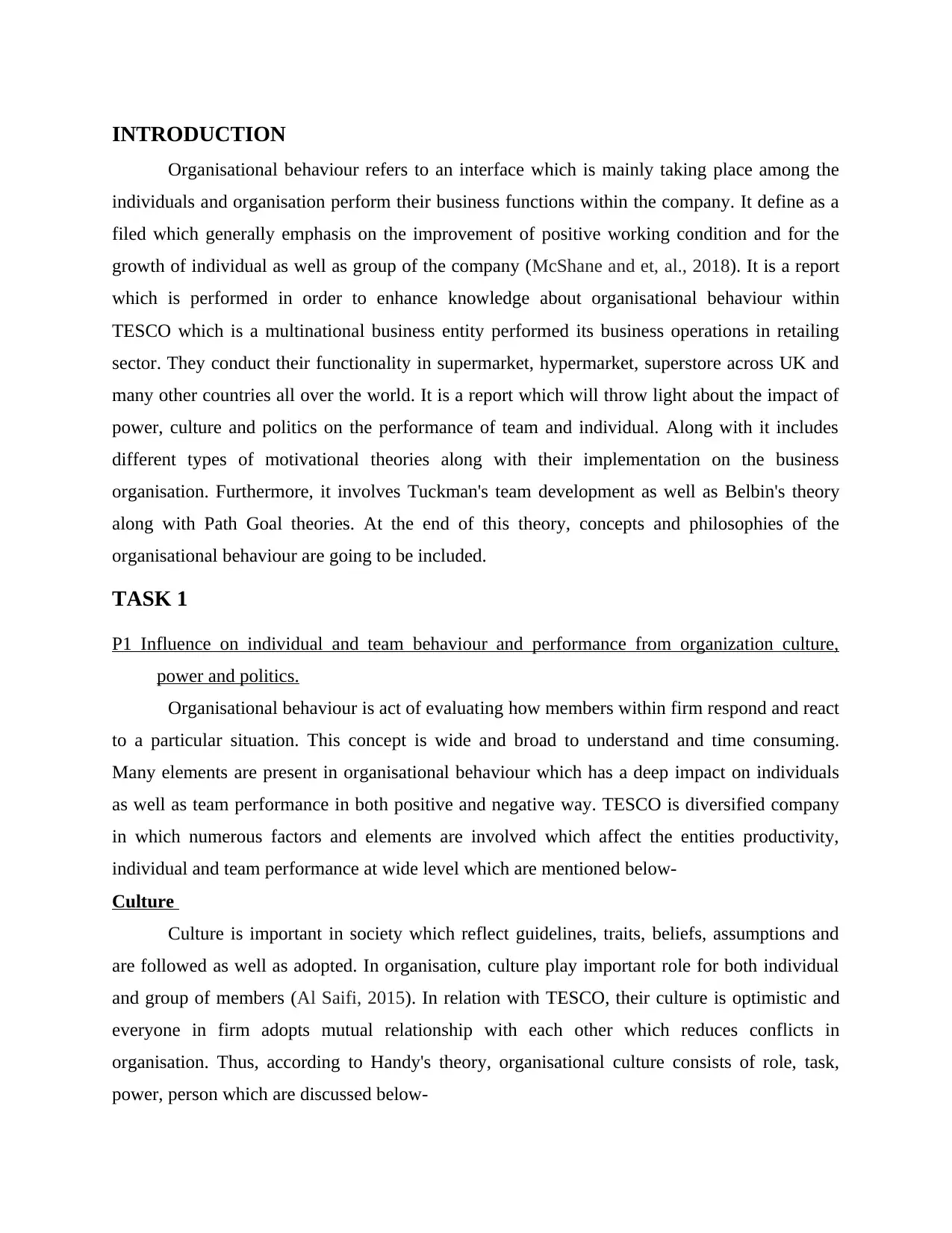
INTRODUCTION
Organisational behaviour refers to an interface which is mainly taking place among the
individuals and organisation perform their business functions within the company. It define as a
filed which generally emphasis on the improvement of positive working condition and for the
growth of individual as well as group of the company (McShane and et, al., 2018). It is a report
which is performed in order to enhance knowledge about organisational behaviour within
TESCO which is a multinational business entity performed its business operations in retailing
sector. They conduct their functionality in supermarket, hypermarket, superstore across UK and
many other countries all over the world. It is a report which will throw light about the impact of
power, culture and politics on the performance of team and individual. Along with it includes
different types of motivational theories along with their implementation on the business
organisation. Furthermore, it involves Tuckman's team development as well as Belbin's theory
along with Path Goal theories. At the end of this theory, concepts and philosophies of the
organisational behaviour are going to be included.
TASK 1
P1 Influence on individual and team behaviour and performance from organization culture,
power and politics.
Organisational behaviour is act of evaluating how members within firm respond and react
to a particular situation. This concept is wide and broad to understand and time consuming.
Many elements are present in organisational behaviour which has a deep impact on individuals
as well as team performance in both positive and negative way. TESCO is diversified company
in which numerous factors and elements are involved which affect the entities productivity,
individual and team performance at wide level which are mentioned below-
Culture
Culture is important in society which reflect guidelines, traits, beliefs, assumptions and
are followed as well as adopted. In organisation, culture play important role for both individual
and group of members (Al Saifi, 2015). In relation with TESCO, their culture is optimistic and
everyone in firm adopts mutual relationship with each other which reduces conflicts in
organisation. Thus, according to Handy's theory, organisational culture consists of role, task,
power, person which are discussed below-
Organisational behaviour refers to an interface which is mainly taking place among the
individuals and organisation perform their business functions within the company. It define as a
filed which generally emphasis on the improvement of positive working condition and for the
growth of individual as well as group of the company (McShane and et, al., 2018). It is a report
which is performed in order to enhance knowledge about organisational behaviour within
TESCO which is a multinational business entity performed its business operations in retailing
sector. They conduct their functionality in supermarket, hypermarket, superstore across UK and
many other countries all over the world. It is a report which will throw light about the impact of
power, culture and politics on the performance of team and individual. Along with it includes
different types of motivational theories along with their implementation on the business
organisation. Furthermore, it involves Tuckman's team development as well as Belbin's theory
along with Path Goal theories. At the end of this theory, concepts and philosophies of the
organisational behaviour are going to be included.
TASK 1
P1 Influence on individual and team behaviour and performance from organization culture,
power and politics.
Organisational behaviour is act of evaluating how members within firm respond and react
to a particular situation. This concept is wide and broad to understand and time consuming.
Many elements are present in organisational behaviour which has a deep impact on individuals
as well as team performance in both positive and negative way. TESCO is diversified company
in which numerous factors and elements are involved which affect the entities productivity,
individual and team performance at wide level which are mentioned below-
Culture
Culture is important in society which reflect guidelines, traits, beliefs, assumptions and
are followed as well as adopted. In organisation, culture play important role for both individual
and group of members (Al Saifi, 2015). In relation with TESCO, their culture is optimistic and
everyone in firm adopts mutual relationship with each other which reduces conflicts in
organisation. Thus, according to Handy's theory, organisational culture consists of role, task,
power, person which are discussed below-
⊘ This is a preview!⊘
Do you want full access?
Subscribe today to unlock all pages.

Trusted by 1+ million students worldwide
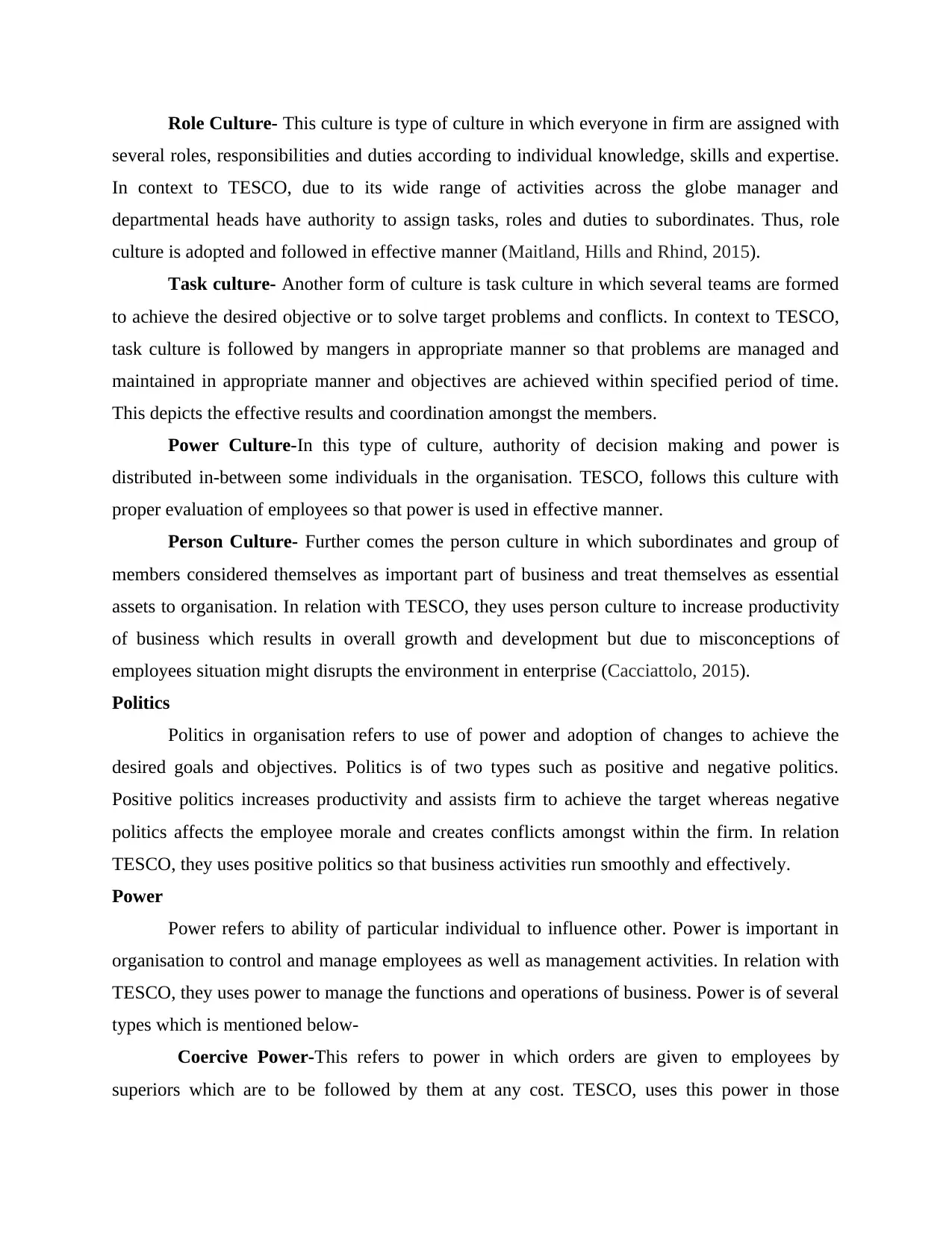
Role Culture- This culture is type of culture in which everyone in firm are assigned with
several roles, responsibilities and duties according to individual knowledge, skills and expertise.
In context to TESCO, due to its wide range of activities across the globe manager and
departmental heads have authority to assign tasks, roles and duties to subordinates. Thus, role
culture is adopted and followed in effective manner (Maitland, Hills and Rhind, 2015).
Task culture- Another form of culture is task culture in which several teams are formed
to achieve the desired objective or to solve target problems and conflicts. In context to TESCO,
task culture is followed by mangers in appropriate manner so that problems are managed and
maintained in appropriate manner and objectives are achieved within specified period of time.
This depicts the effective results and coordination amongst the members.
Power Culture-In this type of culture, authority of decision making and power is
distributed in-between some individuals in the organisation. TESCO, follows this culture with
proper evaluation of employees so that power is used in effective manner.
Person Culture- Further comes the person culture in which subordinates and group of
members considered themselves as important part of business and treat themselves as essential
assets to organisation. In relation with TESCO, they uses person culture to increase productivity
of business which results in overall growth and development but due to misconceptions of
employees situation might disrupts the environment in enterprise (Cacciattolo, 2015).
Politics
Politics in organisation refers to use of power and adoption of changes to achieve the
desired goals and objectives. Politics is of two types such as positive and negative politics.
Positive politics increases productivity and assists firm to achieve the target whereas negative
politics affects the employee morale and creates conflicts amongst within the firm. In relation
TESCO, they uses positive politics so that business activities run smoothly and effectively.
Power
Power refers to ability of particular individual to influence other. Power is important in
organisation to control and manage employees as well as management activities. In relation with
TESCO, they uses power to manage the functions and operations of business. Power is of several
types which is mentioned below-
Coercive Power-This refers to power in which orders are given to employees by
superiors which are to be followed by them at any cost. TESCO, uses this power in those
several roles, responsibilities and duties according to individual knowledge, skills and expertise.
In context to TESCO, due to its wide range of activities across the globe manager and
departmental heads have authority to assign tasks, roles and duties to subordinates. Thus, role
culture is adopted and followed in effective manner (Maitland, Hills and Rhind, 2015).
Task culture- Another form of culture is task culture in which several teams are formed
to achieve the desired objective or to solve target problems and conflicts. In context to TESCO,
task culture is followed by mangers in appropriate manner so that problems are managed and
maintained in appropriate manner and objectives are achieved within specified period of time.
This depicts the effective results and coordination amongst the members.
Power Culture-In this type of culture, authority of decision making and power is
distributed in-between some individuals in the organisation. TESCO, follows this culture with
proper evaluation of employees so that power is used in effective manner.
Person Culture- Further comes the person culture in which subordinates and group of
members considered themselves as important part of business and treat themselves as essential
assets to organisation. In relation with TESCO, they uses person culture to increase productivity
of business which results in overall growth and development but due to misconceptions of
employees situation might disrupts the environment in enterprise (Cacciattolo, 2015).
Politics
Politics in organisation refers to use of power and adoption of changes to achieve the
desired goals and objectives. Politics is of two types such as positive and negative politics.
Positive politics increases productivity and assists firm to achieve the target whereas negative
politics affects the employee morale and creates conflicts amongst within the firm. In relation
TESCO, they uses positive politics so that business activities run smoothly and effectively.
Power
Power refers to ability of particular individual to influence other. Power is important in
organisation to control and manage employees as well as management activities. In relation with
TESCO, they uses power to manage the functions and operations of business. Power is of several
types which is mentioned below-
Coercive Power-This refers to power in which orders are given to employees by
superiors which are to be followed by them at any cost. TESCO, uses this power in those
Paraphrase This Document
Need a fresh take? Get an instant paraphrase of this document with our AI Paraphraser
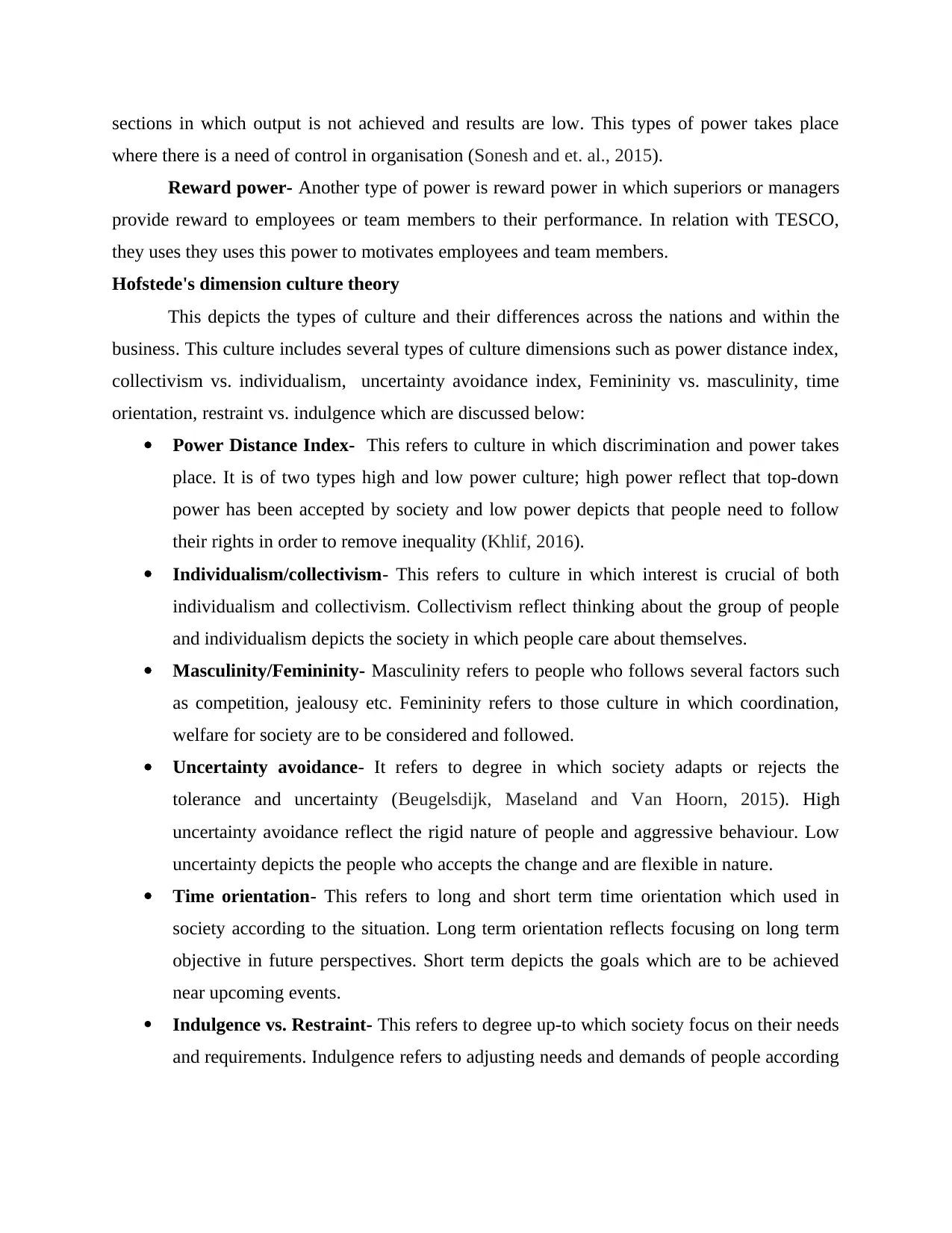
sections in which output is not achieved and results are low. This types of power takes place
where there is a need of control in organisation (Sonesh and et. al., 2015).
Reward power- Another type of power is reward power in which superiors or managers
provide reward to employees or team members to their performance. In relation with TESCO,
they uses they uses this power to motivates employees and team members.
Hofstede's dimension culture theory
This depicts the types of culture and their differences across the nations and within the
business. This culture includes several types of culture dimensions such as power distance index,
collectivism vs. individualism, uncertainty avoidance index, Femininity vs. masculinity, time
orientation, restraint vs. indulgence which are discussed below:
Power Distance Index- This refers to culture in which discrimination and power takes
place. It is of two types high and low power culture; high power reflect that top-down
power has been accepted by society and low power depicts that people need to follow
their rights in order to remove inequality (Khlif, 2016).
Individualism/collectivism- This refers to culture in which interest is crucial of both
individualism and collectivism. Collectivism reflect thinking about the group of people
and individualism depicts the society in which people care about themselves.
Masculinity/Femininity- Masculinity refers to people who follows several factors such
as competition, jealousy etc. Femininity refers to those culture in which coordination,
welfare for society are to be considered and followed.
Uncertainty avoidance- It refers to degree in which society adapts or rejects the
tolerance and uncertainty (Beugelsdijk, Maseland and Van Hoorn, 2015). High
uncertainty avoidance reflect the rigid nature of people and aggressive behaviour. Low
uncertainty depicts the people who accepts the change and are flexible in nature.
Time orientation- This refers to long and short term time orientation which used in
society according to the situation. Long term orientation reflects focusing on long term
objective in future perspectives. Short term depicts the goals which are to be achieved
near upcoming events.
Indulgence vs. Restraint- This refers to degree up-to which society focus on their needs
and requirements. Indulgence refers to adjusting needs and demands of people according
where there is a need of control in organisation (Sonesh and et. al., 2015).
Reward power- Another type of power is reward power in which superiors or managers
provide reward to employees or team members to their performance. In relation with TESCO,
they uses they uses this power to motivates employees and team members.
Hofstede's dimension culture theory
This depicts the types of culture and their differences across the nations and within the
business. This culture includes several types of culture dimensions such as power distance index,
collectivism vs. individualism, uncertainty avoidance index, Femininity vs. masculinity, time
orientation, restraint vs. indulgence which are discussed below:
Power Distance Index- This refers to culture in which discrimination and power takes
place. It is of two types high and low power culture; high power reflect that top-down
power has been accepted by society and low power depicts that people need to follow
their rights in order to remove inequality (Khlif, 2016).
Individualism/collectivism- This refers to culture in which interest is crucial of both
individualism and collectivism. Collectivism reflect thinking about the group of people
and individualism depicts the society in which people care about themselves.
Masculinity/Femininity- Masculinity refers to people who follows several factors such
as competition, jealousy etc. Femininity refers to those culture in which coordination,
welfare for society are to be considered and followed.
Uncertainty avoidance- It refers to degree in which society adapts or rejects the
tolerance and uncertainty (Beugelsdijk, Maseland and Van Hoorn, 2015). High
uncertainty avoidance reflect the rigid nature of people and aggressive behaviour. Low
uncertainty depicts the people who accepts the change and are flexible in nature.
Time orientation- This refers to long and short term time orientation which used in
society according to the situation. Long term orientation reflects focusing on long term
objective in future perspectives. Short term depicts the goals which are to be achieved
near upcoming events.
Indulgence vs. Restraint- This refers to degree up-to which society focus on their needs
and requirements. Indulgence refers to adjusting needs and demands of people according
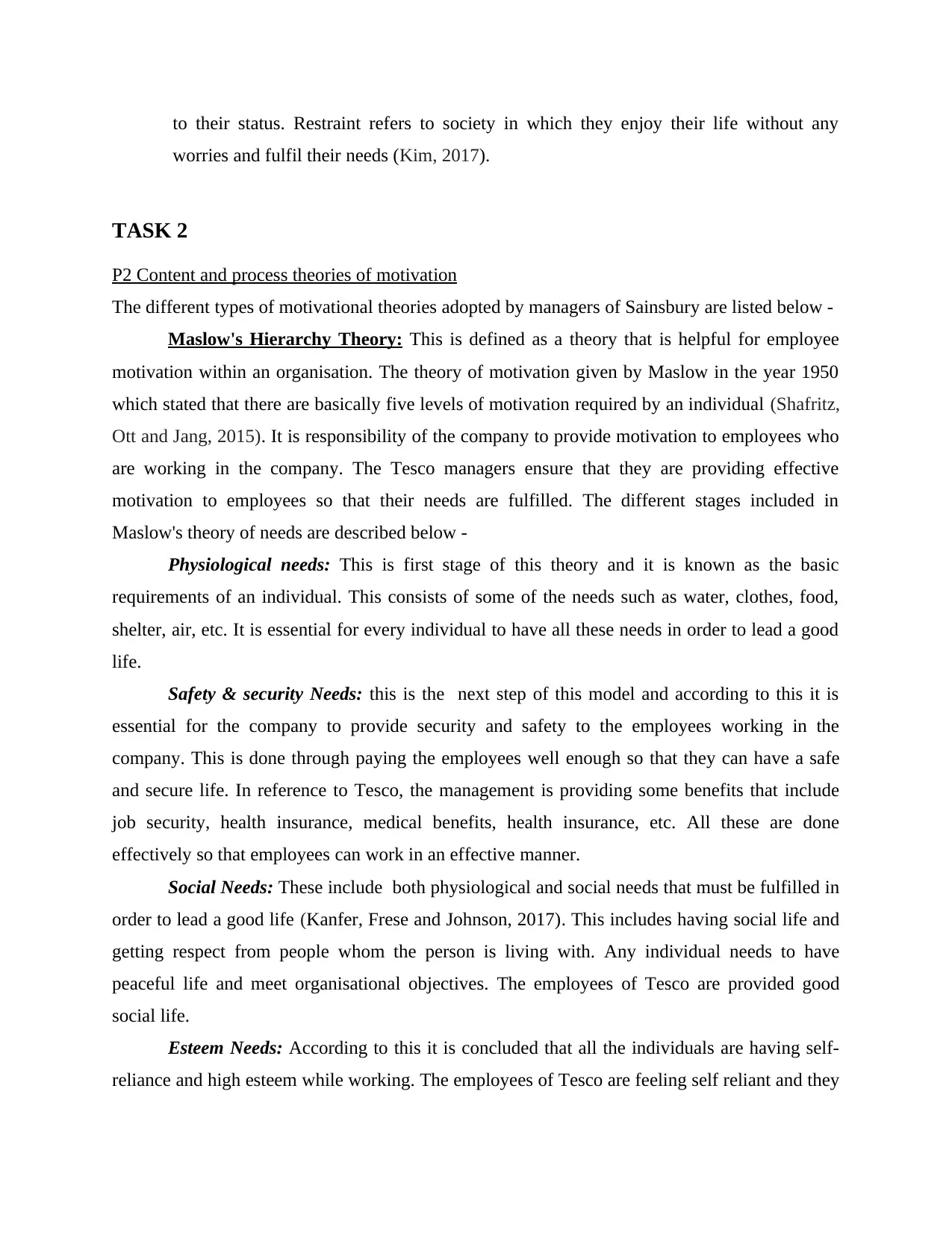
to their status. Restraint refers to society in which they enjoy their life without any
worries and fulfil their needs (Kim, 2017).
TASK 2
P2 Content and process theories of motivation
The different types of motivational theories adopted by managers of Sainsbury are listed below -
Maslow's Hierarchy Theory: This is defined as a theory that is helpful for employee
motivation within an organisation. The theory of motivation given by Maslow in the year 1950
which stated that there are basically five levels of motivation required by an individual (Shafritz,
Ott and Jang, 2015). It is responsibility of the company to provide motivation to employees who
are working in the company. The Tesco managers ensure that they are providing effective
motivation to employees so that their needs are fulfilled. The different stages included in
Maslow's theory of needs are described below -
Physiological needs: This is first stage of this theory and it is known as the basic
requirements of an individual. This consists of some of the needs such as water, clothes, food,
shelter, air, etc. It is essential for every individual to have all these needs in order to lead a good
life.
Safety & security Needs: this is the next step of this model and according to this it is
essential for the company to provide security and safety to the employees working in the
company. This is done through paying the employees well enough so that they can have a safe
and secure life. In reference to Tesco, the management is providing some benefits that include
job security, health insurance, medical benefits, health insurance, etc. All these are done
effectively so that employees can work in an effective manner.
Social Needs: These include both physiological and social needs that must be fulfilled in
order to lead a good life (Kanfer, Frese and Johnson, 2017). This includes having social life and
getting respect from people whom the person is living with. Any individual needs to have
peaceful life and meet organisational objectives. The employees of Tesco are provided good
social life.
Esteem Needs: According to this it is concluded that all the individuals are having self-
reliance and high esteem while working. The employees of Tesco are feeling self reliant and they
worries and fulfil their needs (Kim, 2017).
TASK 2
P2 Content and process theories of motivation
The different types of motivational theories adopted by managers of Sainsbury are listed below -
Maslow's Hierarchy Theory: This is defined as a theory that is helpful for employee
motivation within an organisation. The theory of motivation given by Maslow in the year 1950
which stated that there are basically five levels of motivation required by an individual (Shafritz,
Ott and Jang, 2015). It is responsibility of the company to provide motivation to employees who
are working in the company. The Tesco managers ensure that they are providing effective
motivation to employees so that their needs are fulfilled. The different stages included in
Maslow's theory of needs are described below -
Physiological needs: This is first stage of this theory and it is known as the basic
requirements of an individual. This consists of some of the needs such as water, clothes, food,
shelter, air, etc. It is essential for every individual to have all these needs in order to lead a good
life.
Safety & security Needs: this is the next step of this model and according to this it is
essential for the company to provide security and safety to the employees working in the
company. This is done through paying the employees well enough so that they can have a safe
and secure life. In reference to Tesco, the management is providing some benefits that include
job security, health insurance, medical benefits, health insurance, etc. All these are done
effectively so that employees can work in an effective manner.
Social Needs: These include both physiological and social needs that must be fulfilled in
order to lead a good life (Kanfer, Frese and Johnson, 2017). This includes having social life and
getting respect from people whom the person is living with. Any individual needs to have
peaceful life and meet organisational objectives. The employees of Tesco are provided good
social life.
Esteem Needs: According to this it is concluded that all the individuals are having self-
reliance and high esteem while working. The employees of Tesco are feeling self reliant and they
⊘ This is a preview!⊘
Do you want full access?
Subscribe today to unlock all pages.

Trusted by 1+ million students worldwide
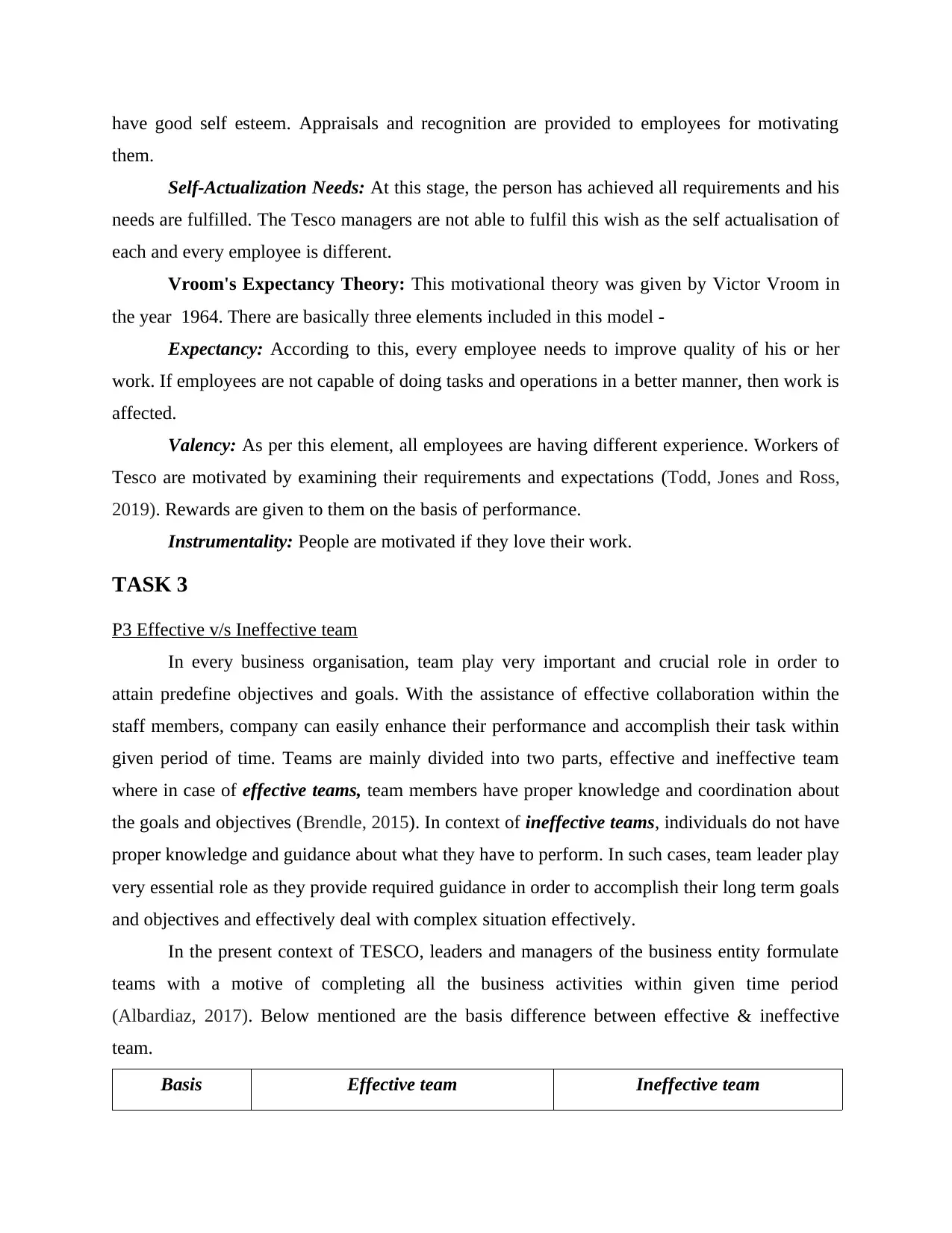
have good self esteem. Appraisals and recognition are provided to employees for motivating
them.
Self-Actualization Needs: At this stage, the person has achieved all requirements and his
needs are fulfilled. The Tesco managers are not able to fulfil this wish as the self actualisation of
each and every employee is different.
Vroom's Expectancy Theory: This motivational theory was given by Victor Vroom in
the year 1964. There are basically three elements included in this model -
Expectancy: According to this, every employee needs to improve quality of his or her
work. If employees are not capable of doing tasks and operations in a better manner, then work is
affected.
Valency: As per this element, all employees are having different experience. Workers of
Tesco are motivated by examining their requirements and expectations (Todd, Jones and Ross,
2019). Rewards are given to them on the basis of performance.
Instrumentality: People are motivated if they love their work.
TASK 3
P3 Effective v/s Ineffective team
In every business organisation, team play very important and crucial role in order to
attain predefine objectives and goals. With the assistance of effective collaboration within the
staff members, company can easily enhance their performance and accomplish their task within
given period of time. Teams are mainly divided into two parts, effective and ineffective team
where in case of effective teams, team members have proper knowledge and coordination about
the goals and objectives (Brendle, 2015). In context of ineffective teams, individuals do not have
proper knowledge and guidance about what they have to perform. In such cases, team leader play
very essential role as they provide required guidance in order to accomplish their long term goals
and objectives and effectively deal with complex situation effectively.
In the present context of TESCO, leaders and managers of the business entity formulate
teams with a motive of completing all the business activities within given time period
(Albardiaz, 2017). Below mentioned are the basis difference between effective & ineffective
team.
Basis Effective team Ineffective team
them.
Self-Actualization Needs: At this stage, the person has achieved all requirements and his
needs are fulfilled. The Tesco managers are not able to fulfil this wish as the self actualisation of
each and every employee is different.
Vroom's Expectancy Theory: This motivational theory was given by Victor Vroom in
the year 1964. There are basically three elements included in this model -
Expectancy: According to this, every employee needs to improve quality of his or her
work. If employees are not capable of doing tasks and operations in a better manner, then work is
affected.
Valency: As per this element, all employees are having different experience. Workers of
Tesco are motivated by examining their requirements and expectations (Todd, Jones and Ross,
2019). Rewards are given to them on the basis of performance.
Instrumentality: People are motivated if they love their work.
TASK 3
P3 Effective v/s Ineffective team
In every business organisation, team play very important and crucial role in order to
attain predefine objectives and goals. With the assistance of effective collaboration within the
staff members, company can easily enhance their performance and accomplish their task within
given period of time. Teams are mainly divided into two parts, effective and ineffective team
where in case of effective teams, team members have proper knowledge and coordination about
the goals and objectives (Brendle, 2015). In context of ineffective teams, individuals do not have
proper knowledge and guidance about what they have to perform. In such cases, team leader play
very essential role as they provide required guidance in order to accomplish their long term goals
and objectives and effectively deal with complex situation effectively.
In the present context of TESCO, leaders and managers of the business entity formulate
teams with a motive of completing all the business activities within given time period
(Albardiaz, 2017). Below mentioned are the basis difference between effective & ineffective
team.
Basis Effective team Ineffective team
Paraphrase This Document
Need a fresh take? Get an instant paraphrase of this document with our AI Paraphraser
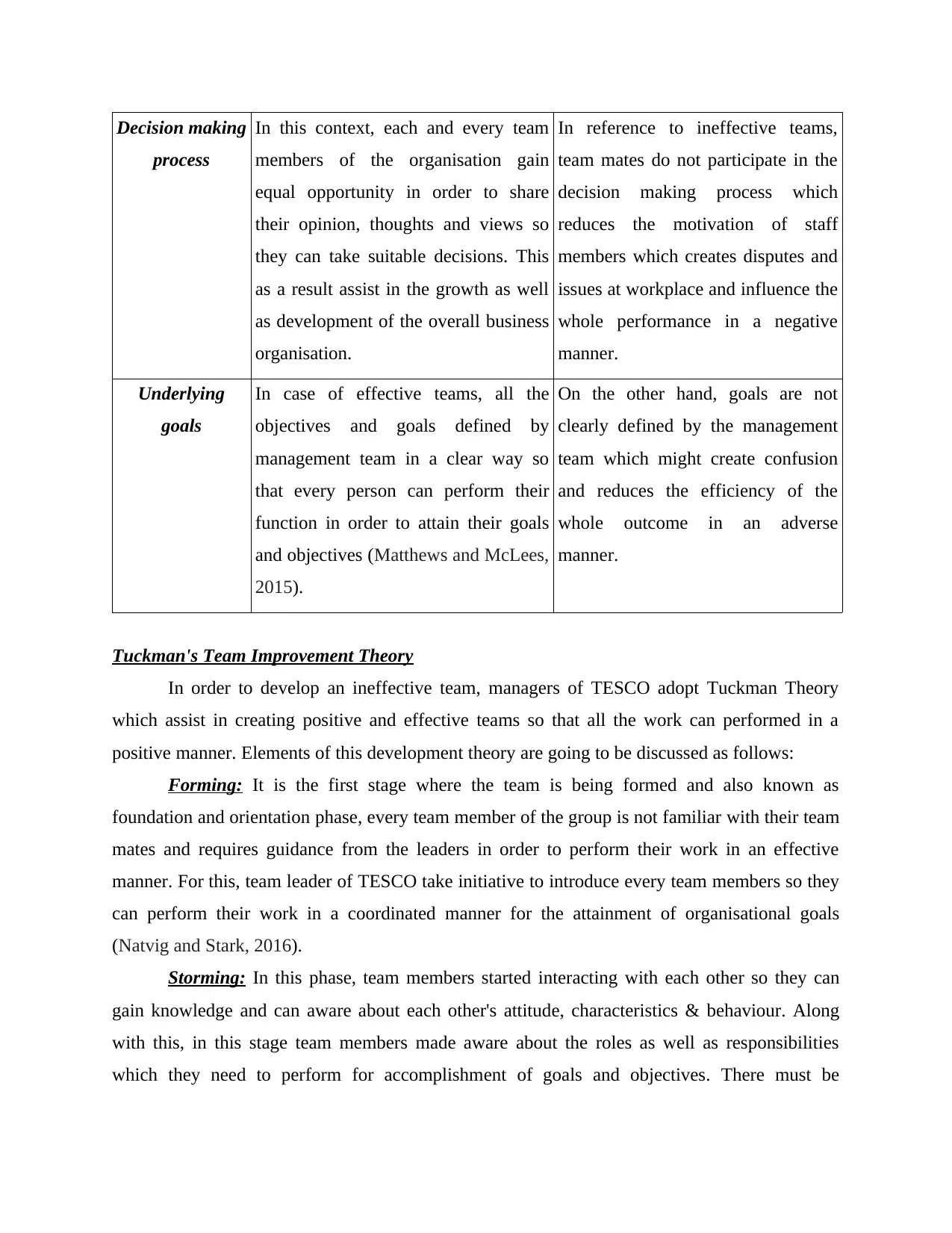
Decision making
process
In this context, each and every team
members of the organisation gain
equal opportunity in order to share
their opinion, thoughts and views so
they can take suitable decisions. This
as a result assist in the growth as well
as development of the overall business
organisation.
In reference to ineffective teams,
team mates do not participate in the
decision making process which
reduces the motivation of staff
members which creates disputes and
issues at workplace and influence the
whole performance in a negative
manner.
Underlying
goals
In case of effective teams, all the
objectives and goals defined by
management team in a clear way so
that every person can perform their
function in order to attain their goals
and objectives (Matthews and McLees,
2015).
On the other hand, goals are not
clearly defined by the management
team which might create confusion
and reduces the efficiency of the
whole outcome in an adverse
manner.
Tuckman's Team Improvement Theory
In order to develop an ineffective team, managers of TESCO adopt Tuckman Theory
which assist in creating positive and effective teams so that all the work can performed in a
positive manner. Elements of this development theory are going to be discussed as follows:
Forming: It is the first stage where the team is being formed and also known as
foundation and orientation phase, every team member of the group is not familiar with their team
mates and requires guidance from the leaders in order to perform their work in an effective
manner. For this, team leader of TESCO take initiative to introduce every team members so they
can perform their work in a coordinated manner for the attainment of organisational goals
(Natvig and Stark, 2016).
Storming: In this phase, team members started interacting with each other so they can
gain knowledge and can aware about each other's attitude, characteristics & behaviour. Along
with this, in this stage team members made aware about the roles as well as responsibilities
which they need to perform for accomplishment of goals and objectives. There must be
process
In this context, each and every team
members of the organisation gain
equal opportunity in order to share
their opinion, thoughts and views so
they can take suitable decisions. This
as a result assist in the growth as well
as development of the overall business
organisation.
In reference to ineffective teams,
team mates do not participate in the
decision making process which
reduces the motivation of staff
members which creates disputes and
issues at workplace and influence the
whole performance in a negative
manner.
Underlying
goals
In case of effective teams, all the
objectives and goals defined by
management team in a clear way so
that every person can perform their
function in order to attain their goals
and objectives (Matthews and McLees,
2015).
On the other hand, goals are not
clearly defined by the management
team which might create confusion
and reduces the efficiency of the
whole outcome in an adverse
manner.
Tuckman's Team Improvement Theory
In order to develop an ineffective team, managers of TESCO adopt Tuckman Theory
which assist in creating positive and effective teams so that all the work can performed in a
positive manner. Elements of this development theory are going to be discussed as follows:
Forming: It is the first stage where the team is being formed and also known as
foundation and orientation phase, every team member of the group is not familiar with their team
mates and requires guidance from the leaders in order to perform their work in an effective
manner. For this, team leader of TESCO take initiative to introduce every team members so they
can perform their work in a coordinated manner for the attainment of organisational goals
(Natvig and Stark, 2016).
Storming: In this phase, team members started interacting with each other so they can
gain knowledge and can aware about each other's attitude, characteristics & behaviour. Along
with this, in this stage team members made aware about the roles as well as responsibilities
which they need to perform for accomplishment of goals and objectives. There must be
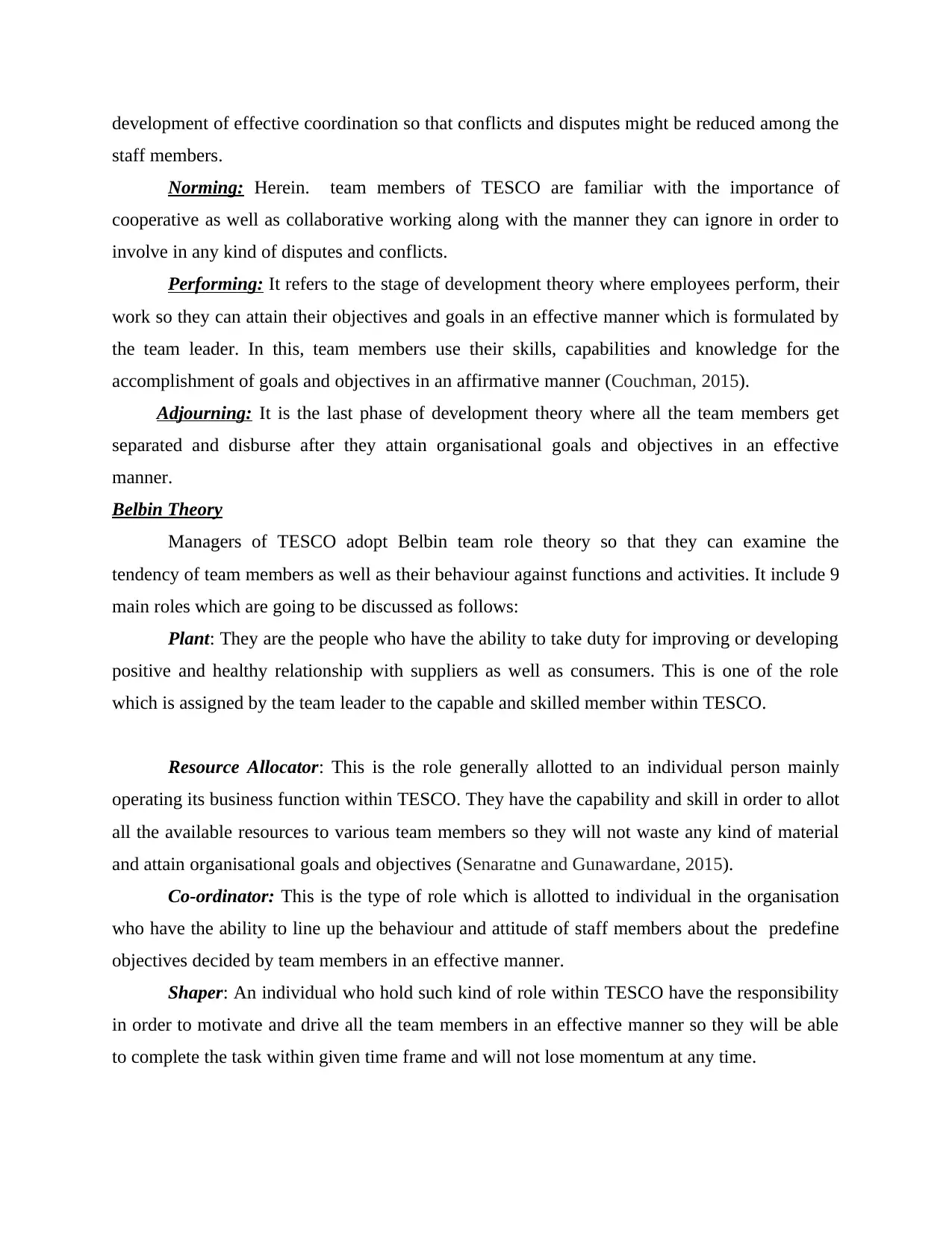
development of effective coordination so that conflicts and disputes might be reduced among the
staff members.
Norming: Herein. team members of TESCO are familiar with the importance of
cooperative as well as collaborative working along with the manner they can ignore in order to
involve in any kind of disputes and conflicts.
Performing: It refers to the stage of development theory where employees perform, their
work so they can attain their objectives and goals in an effective manner which is formulated by
the team leader. In this, team members use their skills, capabilities and knowledge for the
accomplishment of goals and objectives in an affirmative manner (Couchman, 2015).
Adjourning: It is the last phase of development theory where all the team members get
separated and disburse after they attain organisational goals and objectives in an effective
manner.
Belbin Theory
Managers of TESCO adopt Belbin team role theory so that they can examine the
tendency of team members as well as their behaviour against functions and activities. It include 9
main roles which are going to be discussed as follows:
Plant: They are the people who have the ability to take duty for improving or developing
positive and healthy relationship with suppliers as well as consumers. This is one of the role
which is assigned by the team leader to the capable and skilled member within TESCO.
Resource Allocator: This is the role generally allotted to an individual person mainly
operating its business function within TESCO. They have the capability and skill in order to allot
all the available resources to various team members so they will not waste any kind of material
and attain organisational goals and objectives (Senaratne and Gunawardane, 2015).
Co-ordinator: This is the type of role which is allotted to individual in the organisation
who have the ability to line up the behaviour and attitude of staff members about the predefine
objectives decided by team members in an effective manner.
Shaper: An individual who hold such kind of role within TESCO have the responsibility
in order to motivate and drive all the team members in an effective manner so they will be able
to complete the task within given time frame and will not lose momentum at any time.
staff members.
Norming: Herein. team members of TESCO are familiar with the importance of
cooperative as well as collaborative working along with the manner they can ignore in order to
involve in any kind of disputes and conflicts.
Performing: It refers to the stage of development theory where employees perform, their
work so they can attain their objectives and goals in an effective manner which is formulated by
the team leader. In this, team members use their skills, capabilities and knowledge for the
accomplishment of goals and objectives in an affirmative manner (Couchman, 2015).
Adjourning: It is the last phase of development theory where all the team members get
separated and disburse after they attain organisational goals and objectives in an effective
manner.
Belbin Theory
Managers of TESCO adopt Belbin team role theory so that they can examine the
tendency of team members as well as their behaviour against functions and activities. It include 9
main roles which are going to be discussed as follows:
Plant: They are the people who have the ability to take duty for improving or developing
positive and healthy relationship with suppliers as well as consumers. This is one of the role
which is assigned by the team leader to the capable and skilled member within TESCO.
Resource Allocator: This is the role generally allotted to an individual person mainly
operating its business function within TESCO. They have the capability and skill in order to allot
all the available resources to various team members so they will not waste any kind of material
and attain organisational goals and objectives (Senaratne and Gunawardane, 2015).
Co-ordinator: This is the type of role which is allotted to individual in the organisation
who have the ability to line up the behaviour and attitude of staff members about the predefine
objectives decided by team members in an effective manner.
Shaper: An individual who hold such kind of role within TESCO have the responsibility
in order to motivate and drive all the team members in an effective manner so they will be able
to complete the task within given time frame and will not lose momentum at any time.
⊘ This is a preview!⊘
Do you want full access?
Subscribe today to unlock all pages.

Trusted by 1+ million students worldwide
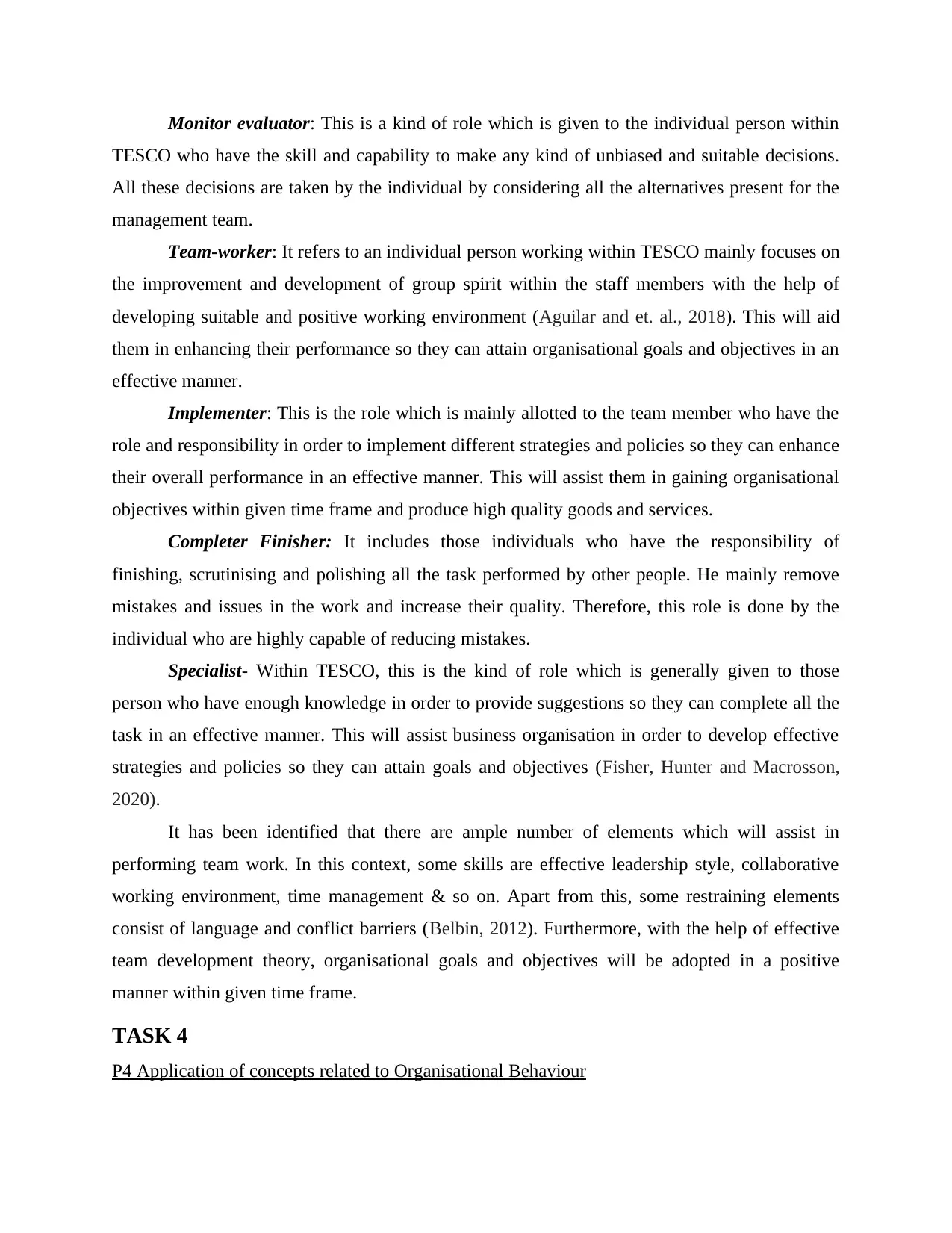
Monitor evaluator: This is a kind of role which is given to the individual person within
TESCO who have the skill and capability to make any kind of unbiased and suitable decisions.
All these decisions are taken by the individual by considering all the alternatives present for the
management team.
Team-worker: It refers to an individual person working within TESCO mainly focuses on
the improvement and development of group spirit within the staff members with the help of
developing suitable and positive working environment (Aguilar and et. al., 2018). This will aid
them in enhancing their performance so they can attain organisational goals and objectives in an
effective manner.
Implementer: This is the role which is mainly allotted to the team member who have the
role and responsibility in order to implement different strategies and policies so they can enhance
their overall performance in an effective manner. This will assist them in gaining organisational
objectives within given time frame and produce high quality goods and services.
Completer Finisher: It includes those individuals who have the responsibility of
finishing, scrutinising and polishing all the task performed by other people. He mainly remove
mistakes and issues in the work and increase their quality. Therefore, this role is done by the
individual who are highly capable of reducing mistakes.
Specialist- Within TESCO, this is the kind of role which is generally given to those
person who have enough knowledge in order to provide suggestions so they can complete all the
task in an effective manner. This will assist business organisation in order to develop effective
strategies and policies so they can attain goals and objectives (Fisher, Hunter and Macrosson,
2020).
It has been identified that there are ample number of elements which will assist in
performing team work. In this context, some skills are effective leadership style, collaborative
working environment, time management & so on. Apart from this, some restraining elements
consist of language and conflict barriers (Belbin, 2012). Furthermore, with the help of effective
team development theory, organisational goals and objectives will be adopted in a positive
manner within given time frame.
TASK 4
P4 Application of concepts related to Organisational Behaviour
TESCO who have the skill and capability to make any kind of unbiased and suitable decisions.
All these decisions are taken by the individual by considering all the alternatives present for the
management team.
Team-worker: It refers to an individual person working within TESCO mainly focuses on
the improvement and development of group spirit within the staff members with the help of
developing suitable and positive working environment (Aguilar and et. al., 2018). This will aid
them in enhancing their performance so they can attain organisational goals and objectives in an
effective manner.
Implementer: This is the role which is mainly allotted to the team member who have the
role and responsibility in order to implement different strategies and policies so they can enhance
their overall performance in an effective manner. This will assist them in gaining organisational
objectives within given time frame and produce high quality goods and services.
Completer Finisher: It includes those individuals who have the responsibility of
finishing, scrutinising and polishing all the task performed by other people. He mainly remove
mistakes and issues in the work and increase their quality. Therefore, this role is done by the
individual who are highly capable of reducing mistakes.
Specialist- Within TESCO, this is the kind of role which is generally given to those
person who have enough knowledge in order to provide suggestions so they can complete all the
task in an effective manner. This will assist business organisation in order to develop effective
strategies and policies so they can attain goals and objectives (Fisher, Hunter and Macrosson,
2020).
It has been identified that there are ample number of elements which will assist in
performing team work. In this context, some skills are effective leadership style, collaborative
working environment, time management & so on. Apart from this, some restraining elements
consist of language and conflict barriers (Belbin, 2012). Furthermore, with the help of effective
team development theory, organisational goals and objectives will be adopted in a positive
manner within given time frame.
TASK 4
P4 Application of concepts related to Organisational Behaviour
Paraphrase This Document
Need a fresh take? Get an instant paraphrase of this document with our AI Paraphraser
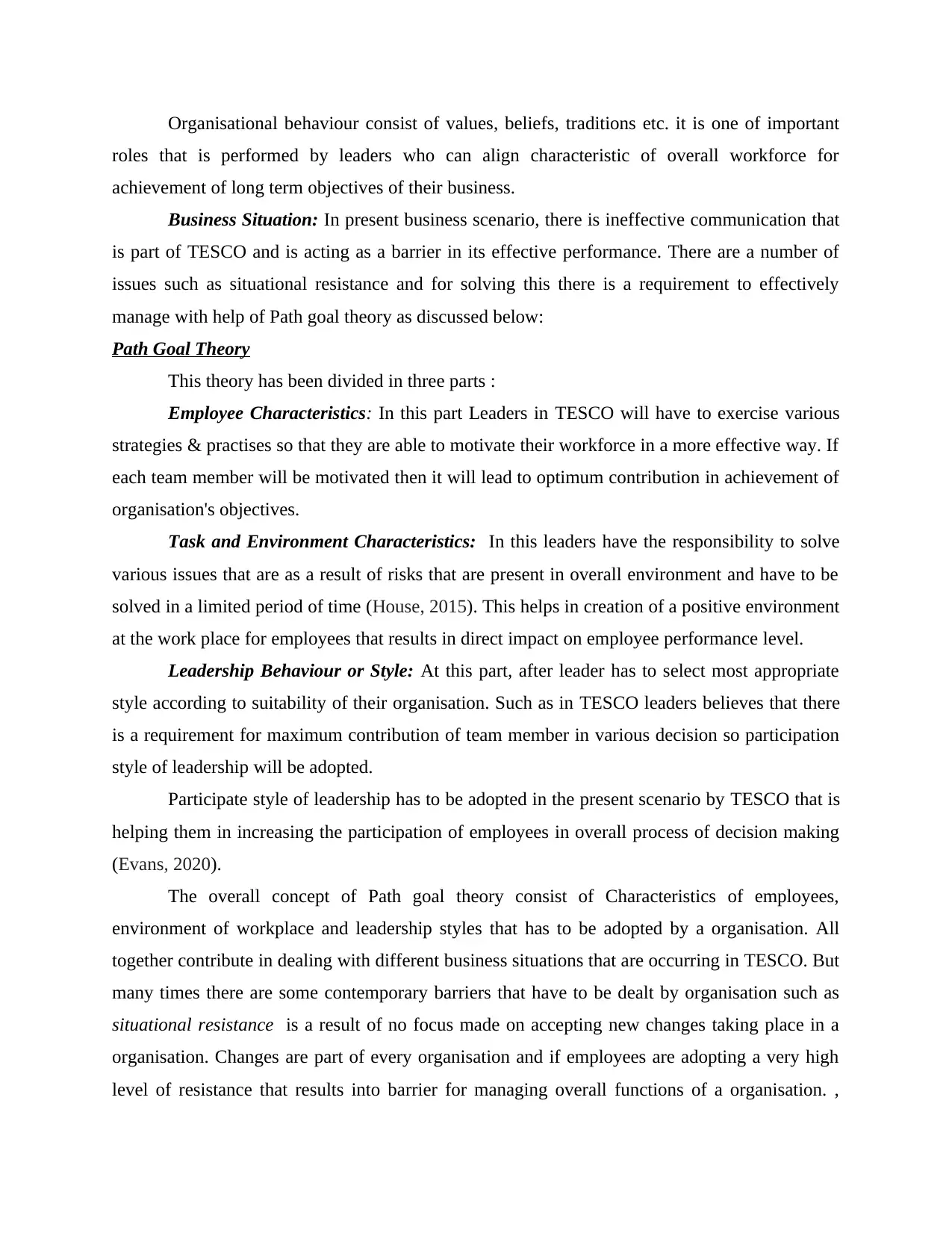
Organisational behaviour consist of values, beliefs, traditions etc. it is one of important
roles that is performed by leaders who can align characteristic of overall workforce for
achievement of long term objectives of their business.
Business Situation: In present business scenario, there is ineffective communication that
is part of TESCO and is acting as a barrier in its effective performance. There are a number of
issues such as situational resistance and for solving this there is a requirement to effectively
manage with help of Path goal theory as discussed below:
Path Goal Theory
This theory has been divided in three parts :
Employee Characteristics: In this part Leaders in TESCO will have to exercise various
strategies & practises so that they are able to motivate their workforce in a more effective way. If
each team member will be motivated then it will lead to optimum contribution in achievement of
organisation's objectives.
Task and Environment Characteristics: In this leaders have the responsibility to solve
various issues that are as a result of risks that are present in overall environment and have to be
solved in a limited period of time (House, 2015). This helps in creation of a positive environment
at the work place for employees that results in direct impact on employee performance level.
Leadership Behaviour or Style: At this part, after leader has to select most appropriate
style according to suitability of their organisation. Such as in TESCO leaders believes that there
is a requirement for maximum contribution of team member in various decision so participation
style of leadership will be adopted.
Participate style of leadership has to be adopted in the present scenario by TESCO that is
helping them in increasing the participation of employees in overall process of decision making
(Evans, 2020).
The overall concept of Path goal theory consist of Characteristics of employees,
environment of workplace and leadership styles that has to be adopted by a organisation. All
together contribute in dealing with different business situations that are occurring in TESCO. But
many times there are some contemporary barriers that have to be dealt by organisation such as
situational resistance is a result of no focus made on accepting new changes taking place in a
organisation. Changes are part of every organisation and if employees are adopting a very high
level of resistance that results into barrier for managing overall functions of a organisation. ,
roles that is performed by leaders who can align characteristic of overall workforce for
achievement of long term objectives of their business.
Business Situation: In present business scenario, there is ineffective communication that
is part of TESCO and is acting as a barrier in its effective performance. There are a number of
issues such as situational resistance and for solving this there is a requirement to effectively
manage with help of Path goal theory as discussed below:
Path Goal Theory
This theory has been divided in three parts :
Employee Characteristics: In this part Leaders in TESCO will have to exercise various
strategies & practises so that they are able to motivate their workforce in a more effective way. If
each team member will be motivated then it will lead to optimum contribution in achievement of
organisation's objectives.
Task and Environment Characteristics: In this leaders have the responsibility to solve
various issues that are as a result of risks that are present in overall environment and have to be
solved in a limited period of time (House, 2015). This helps in creation of a positive environment
at the work place for employees that results in direct impact on employee performance level.
Leadership Behaviour or Style: At this part, after leader has to select most appropriate
style according to suitability of their organisation. Such as in TESCO leaders believes that there
is a requirement for maximum contribution of team member in various decision so participation
style of leadership will be adopted.
Participate style of leadership has to be adopted in the present scenario by TESCO that is
helping them in increasing the participation of employees in overall process of decision making
(Evans, 2020).
The overall concept of Path goal theory consist of Characteristics of employees,
environment of workplace and leadership styles that has to be adopted by a organisation. All
together contribute in dealing with different business situations that are occurring in TESCO. But
many times there are some contemporary barriers that have to be dealt by organisation such as
situational resistance is a result of no focus made on accepting new changes taking place in a
organisation. Changes are part of every organisation and if employees are adopting a very high
level of resistance that results into barrier for managing overall functions of a organisation. ,
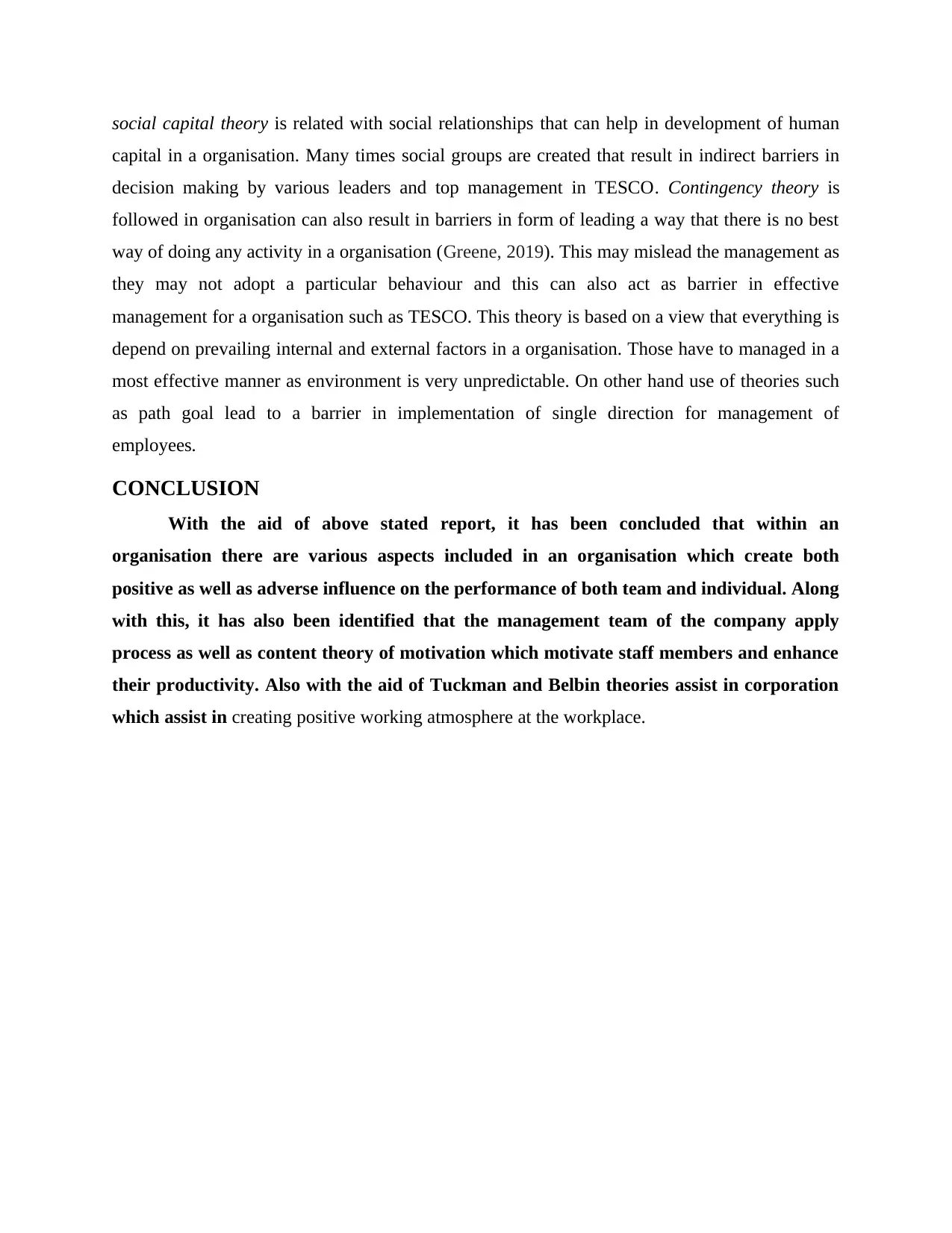
social capital theory is related with social relationships that can help in development of human
capital in a organisation. Many times social groups are created that result in indirect barriers in
decision making by various leaders and top management in TESCO. Contingency theory is
followed in organisation can also result in barriers in form of leading a way that there is no best
way of doing any activity in a organisation (Greene, 2019). This may mislead the management as
they may not adopt a particular behaviour and this can also act as barrier in effective
management for a organisation such as TESCO. This theory is based on a view that everything is
depend on prevailing internal and external factors in a organisation. Those have to managed in a
most effective manner as environment is very unpredictable. On other hand use of theories such
as path goal lead to a barrier in implementation of single direction for management of
employees.
CONCLUSION
With the aid of above stated report, it has been concluded that within an
organisation there are various aspects included in an organisation which create both
positive as well as adverse influence on the performance of both team and individual. Along
with this, it has also been identified that the management team of the company apply
process as well as content theory of motivation which motivate staff members and enhance
their productivity. Also with the aid of Tuckman and Belbin theories assist in corporation
which assist in creating positive working atmosphere at the workplace.
capital in a organisation. Many times social groups are created that result in indirect barriers in
decision making by various leaders and top management in TESCO. Contingency theory is
followed in organisation can also result in barriers in form of leading a way that there is no best
way of doing any activity in a organisation (Greene, 2019). This may mislead the management as
they may not adopt a particular behaviour and this can also act as barrier in effective
management for a organisation such as TESCO. This theory is based on a view that everything is
depend on prevailing internal and external factors in a organisation. Those have to managed in a
most effective manner as environment is very unpredictable. On other hand use of theories such
as path goal lead to a barrier in implementation of single direction for management of
employees.
CONCLUSION
With the aid of above stated report, it has been concluded that within an
organisation there are various aspects included in an organisation which create both
positive as well as adverse influence on the performance of both team and individual. Along
with this, it has also been identified that the management team of the company apply
process as well as content theory of motivation which motivate staff members and enhance
their productivity. Also with the aid of Tuckman and Belbin theories assist in corporation
which assist in creating positive working atmosphere at the workplace.
⊘ This is a preview!⊘
Do you want full access?
Subscribe today to unlock all pages.

Trusted by 1+ million students worldwide
1 out of 14
Related Documents
Your All-in-One AI-Powered Toolkit for Academic Success.
+13062052269
info@desklib.com
Available 24*7 on WhatsApp / Email
![[object Object]](/_next/static/media/star-bottom.7253800d.svg)
Unlock your academic potential
Copyright © 2020–2026 A2Z Services. All Rights Reserved. Developed and managed by ZUCOL.





